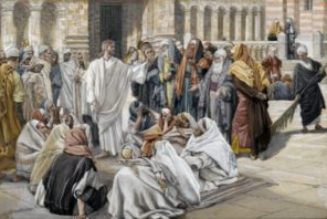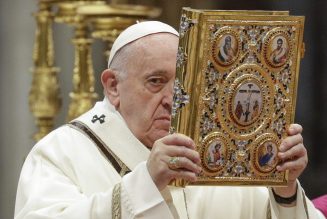
Jesuit Father James Martin has started a new online resource for “LGBTQ” Catholics called “Outreach” that is an enterprise associated with America Media, whose magazine America is the flagship publication of American Jesuits.
Outreach has recently put forward a new series of articles by various theologians, Scripture scholars, and those involved in “LGBTQ” ministry, on how to interpret the Bible’s verses on homosexuality, which some of the contributors describe as “clobber verses” that are used to marginalize and persecute those in the “LGBTQ” community.
The authors are Protestant, Catholic and Jewish, and they present varying arguments with different emphases, all of which are designed to make sure that the biblical verses in question are effectively gutted of their normativity, which opens the door for “LGBTQ” people to take their rightful place in the center of the Church rather than on its margins.
These Outreach essays on the Bible raise several themes, most of which are deeply problematic as presented, that have repercussions that go beyond the topic of homosexuality and gender. Space precludes me from speaking of each author individually, so allow me to highlight these common themes.
First, there is the claim that Jesus never explicitly condemns homosexuality, even though he did condemn such things as divorce and remarriage. But Jesus also never condemns rape, genocide, slavery, spousal abuse, doctor-assisted suicide or bestiality either. Are we to assume, therefore, that these things are “okay,” owing to the silence of Jesus on these matters? Of course not.
Arguments from silence in this context are beyond misleading, and the primary reason why Jesus condemns divorce and remarriage and not homosexuality is precisely because the former was a hotly debated issue in first-century Judaism whereas the latter was not. By all accounts, Jesus clearly seems to have accepted the sexual morality of Judaism, and in the Sermon on the Mount he doubles down on this morality in quite rigorous ways. The silence of Jesus on the issue of homosexuality, therefore, almost certainly has a lot to do with the fact that he just took it as a given that everyone in his listening audience understood that such activities were immoral, which is a view that Jesus himself shared.
Second, in dealing with the various biblical passages in Leviticus and St. Paul, which seem clearly to treat homosexual sex as sinful, many of the authors adopt a curious strategy: They argue that even if the Bible condemns such things, the Bible also advocates for many other things that we now think of as wrong and which we therefore ignore. For example, the Bible seems okay with slavery and stoning people to death for adultery and Sabbath breaking. Therefore, this thinking goes, since the Bible is wrong on those issues, it is also possible, if not probable, that the Bible is wrong on homosexuality, as well.
This is then followed up with the usual condemnations of biblical fundamentalism and literalism, with the clear implication being that if you continue to take such “rigorous” verses seriously, then you are just a fundamentalist who is ignoring the more “inclusive” verses. The authors then present the inclusive verses as more binding and as the better interpretive key to the whole Bible than the more rigorist verses. And it is precisely this interpretive move that allows the authors to portray those who continue to uphold the traditional interpretation as somehow less faithful to this deeper biblical message than the “LGBTQ” advocates.
Paradoxically, this actually means, then, that if you take the biblical injunctions against homosexual acts seriously, then you are guilty of being “unbiblical” in a deeper sense since you are being non-inclusive.
Father Martin, in a recent follow-up post on the Outreach page, adopts precisely this position: He argues that since Catholics are not biblical “fundamentalists” that we are free to marginalize the verses on homosexuality that we find insufficiently inclusive towards those in the “LGBTQ” community. Of course, he does not bother to give us a specific definition of what he means by “fundamentalist,” which leaves the impression that all it means in this context is that these are verses he finds uncomfortable for his agenda of legitimating gay sex, especially since he seems perfectly comfortable to accept the allegedly more “inclusive” verses with the same fundamentalist rigor.
Therefore, absent his own theory of biblical interpretation, he leaves us with no reason for accepting the inclusive verses as binding and normative while rejecting the rigorist verses. There really is no good-faith effort here on Father Martin’s part to give us a nuanced theory of biblical interpretation, and the reality is that this is all just a cheap and deceptive rhetorical move on Father Martin’s part since it uses loaded “clobber words” like “fundamentalist” in deliberately vague ways in order to vilify those with whom he disagrees in a manner that allows him to dismiss their arguments without ever actually dealing with them. Because we all “know” that there is no point in arguing with a “fundamentalist.”
The issue of biblical interpretation is, of course, immensely complex. Therefore, I will say just two things on this matter. First, without further nuance, the argument as presented in these essays, and in Father Martin’s follow-up post, proves too much. Because as it stands the simplistic assertion that we can ignore biblical views on sexuality because the Bible is wrong on a bunch of other stuff opens up the possibility that anyone, anywhere, and for any trendy reason, can simply dismiss the biblical vision in its various particulars on the grounds that this is, after all, just an “Iron Age text that reflects Iron Age intellectual prejudices.” The Bible itself, therefore, now becomes less normative as a regulative text for the Church’s faith than are the insights and values of modernity, which is viewed as more enlightened and scientifically grounded than the biblical authors.
This latter point is highlighted in the fact that Father Martin, in his follow-up post, says that with regard to the issue of transgenderism, “Before the church teaches it needs to listen — to psychiatrists, psychologists, physicians, social scientists, biologists and, especially, transgender people themselves.”
Notably absent from this list is that the Church needs to listen to and follow the Scriptures, as well as her interpretive Tradition on those Scriptures. Absent as well is Christ, the biblical anthropology of creation as “man and woman,” and the sacramental nature of our bodies precisely as sexually gendered bodies, as developed by Pope St. John Paul II in his theology of the body.
And with regard to “listening to scientists,” would Father Martin himself be willing to listen to the scores of reputable scientists who view transgenderism as little more than a social contagion that has engendered a form of hysteria among vulnerable and confused young people? And as for listening to the transgendered themselves, would Father Martin provide a platform on Outreach for the growing legions of those people who have detransitioned and now deeply regret their mutilating surgeries and irreversible sterility that was inflicted upon them when they were young and impressionable? Will he be there to “accompany” those young men who, at age 12, had their genitals cut off or a young woman who had a double mastectomy and a hysterectomy? Will he hear their voices, too?
But all of this approach to biblical exegesis is a very low-brow form of Protestant thinking, since it approaches the biblical text as a “stand-alone” document that is the sole barometer for determining the Church’s moral theology.
But for the Catholic Church, the Bible forms a baseline of moral norms and principles upon which she builds a philosophical and theological superstructure, which has historically been grounded in classical forms of natural-law reasoning. Furthermore, for the Catholic, there is also a wealth of magisterially binding teaching on human sexuality consistently developed over centuries, which cannot be blithely set aside as just so much patriarchal, heteronormative oppression.
Father Martin claims that he does not seek to change these magisterial teachings. Therefore, one would presume that he would also accept the Tradition’s development of how one is to interpret biblical texts in the light of that magisterium. But apparently he does not accept this magisterial tradition. Why else would he promote the biblical interpretation of theologians who do not agree with the Church’s interpretation of the scriptural witness on human sexuality? And why does Father Martin not instead promote on the Outreach website the biblical commentaries of the Church Fathers, or Augustine, or Aquinas, or any other doctor of the Church on this topic?
The dismissal of the biblical verses against homosexuality in the essays in the Outreach Bible study also exhibits a deep flaw in the treatment of the Old Testament Law in general.
The authors speak as if all aspects of the Law are cut out of the same cloth and have equal weight, as if the Law is this big, homogenous, monolithic thing. This then allows them to compare apples and oranges, where differing kinds of “law” within the overarching Law of Moses are treated as all being of equal value: Therefore, if we can now eat pork and shellfish, which was contrary to the cultic purity laws of Judaism, then we can also engage in sexual acts that are contrary to the moral law. And while this might be a possible pathway for some Protestant thinkers, it is no way consonant with an authentically Catholic approach to the Scriptures, which follows St. Paul and the Fathers in viewing the Law as having varying levels of authority and privileges the natural moral law over the cultic and purity laws.
Also left unanswered is why the biblical command to love God and neighbor is not itself a questionable and quaint vestige of Iron Age superstition since the Bible has now been reduced in their hands to a rag-tag assemblage of contradictory texts written by benighted and backward primitives. Even here, therefore, when dealing with the biblical command to love God and neighbor, we see that what is really being held up as binding is not the biblical concept of love and all of its moral entailments, but a modern concept of love, which is clearly taken as superior to the biblical vision.
As such, one gets the clear impression that what is being put forward here is not the Bible at all, but an amorphous pile of modern, therapeutic, sentimentalist goo where the word “love,” no matter how empty its meaning, still has rhetorical utility and is therefore pressed into service to further the subversive undermining of Church teaching by turning it against itself.
Finally, this brings us to the central overarching theme of these essays, and that theme is “radical inclusion.”
The typical assertions are made that Jesus was an advocate for a radically open inclusion that embraced everyone. But this is only half of the truth, and the missing second piece is decisive; and its exclusion from our discussions of inclusion has led to some very big distortions. And the missing second piece is repentance.
Jesus was open to all sinners, but only those sinners who came to him in faith, and with a repentant heart, desiring regenerative grace. Other sinners, like the rich young ruler in Luke’s Gospel, he let walk away and did not pursue in a false accompaniment rooted in a false compassion. Contrast that with Zacchaeus, a sinful tax collector, who came to Jesus already filled with a zeal for repentance and penance.
In other words, Jesus was indeed an advocate for those who had been shunned by society, even if they had been shunned for valid reasons, as in the case of Zacchaeus, but only if they displayed a repentant heart and acknowledged their sins with humility.
For those who did not display such humility and a desire to overcome their sins, he offered much harsher words. But he did indeed have enormous compassion for those who had been unjustly shunned by society, such as women, lepers, foreigners, and even common Roman soldiers. And in Father Martin’s defense, there is a very real sense in which homosexuals have perhaps been singled out for special censure and scrutiny above and beyond what their sin merits.
There can indeed be a form of discrimination in the Church that takes the form of a scapegoating “othering” of whole classes of sinners, all the while ignoring other classes of sinners whose sin seems more “privileged” in a sense. And this scapegoating and vilification, often utterly lacking in compassion and empathy, would indeed be a valid reason for starting a ministry to homosexuals that began with an attempt to “build bridges” via the path of mercy. And if that is all Father Martin is up to, then more power to him. I mean that. But his constant rhetoric about “inclusion” goes well beyond the tender motivations of mercy and prudential pastoral sensitivity to the bruised reed and into the realm of advocacy for softening the moral strictures on homosexual actions as sinful.
There is an urgent need, therefore, to deconstruct this freshly minted mythology of a Jesus who was a gentle, itinerant troubadour of “love is love” non-judgmentalism. What he sought was the elimination of hypocritical, legalistic and magical forms of religious thinking, of a scapegoating religion of hatred of “those others,” and advocated instead for a religion of the transformed heart.
His was a message of inward regeneration now made possible in the new regime of grace being ushered in through his life and teachings. What was formerly an extrinsic “law” will now be an intrinsic law. But it was still a law that Jesus saw as essential to our salvation. And the “inclusion” he preached was that this new regime of grace was open to all — and not just to the Jews.
But it was an inclusion of a radical forgiveness of sins that provoked one to repentance and conversion. It was most certainly not the inclusion of a latitudinarian “live-and-let-live” libertarianism in matters of human sexuality. It is simply a crass anachronism to read back into the inclusion Jesus offered a modern form of antinomian, coffee-shop relativism.
Father Martin says he does not want to “challenge” Church teaching on “LGBTQ” issues. But he then goes on to say that he wants the language of the Catechism to change. He wants the phrase “intrinsically disordered” changed to something else since these words are hurtful. But change it to what? In the past, Father Martin has suggested we change it to “differently ordered.” But this is just one more indication that Father Martin does not think homosexual sex acts are sinful.
We are all, in one sense or another, differently ordered, and this language in no way implies that the “difference” that is in question here is anything more than a quirk of our individuality. I agree with Father Martin that the traditional scholastic language of “disordered” is misunderstood by many today as meaning someone who is seriously mentally ill or something worse. Therefore, perhaps it could be changed from “intrinsically disordered” to “gravely sinful.” But something tells me Father Martin would not like my suggestion any better than the current language in the Catechism.
Jesus did indeed ask us to seek out the outcast, symbolized in his time by the leper, and to never shun anyone as outside of the regime of grace and regeneration. But the lepers who came to Jesus sought healing. And he gave it to them.
We should do likewise and not act as if the answer to the spiritual homelessness of homosexuals is to make us all equally spiritually homeless by burning down the biblical and moral theological bridge and replacing it with a modern, secular one.









